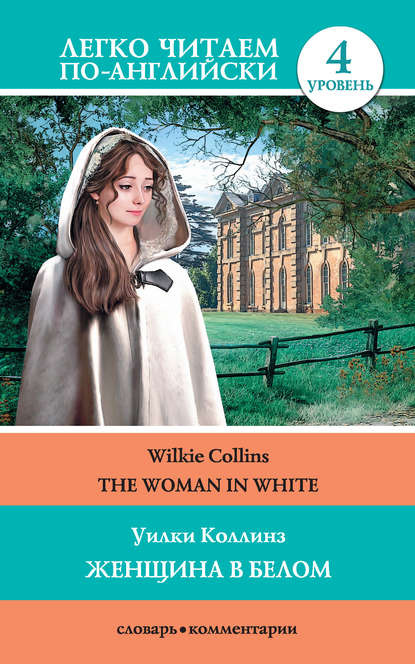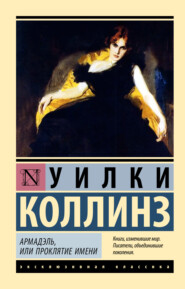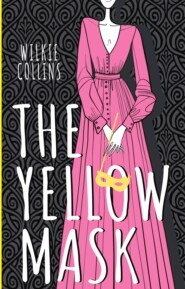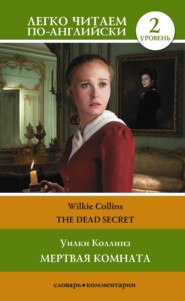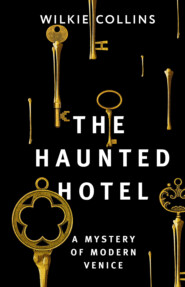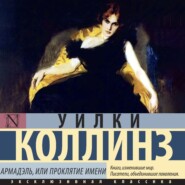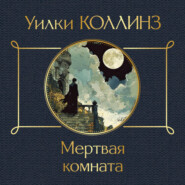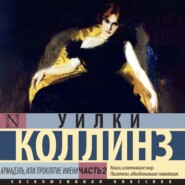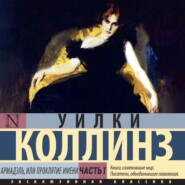По всем вопросам обращайтесь на: info@litportal.ru
(©) 2003-2025.
✖
The Woman in White / Женщина в белом
Настройки чтения
Размер шрифта
Высота строк
Поля
“Thank God!” she said to herself. “I may trust him. I can’t tell you any more.”
The woman was looking very upset.
“Please don’t ask me any more questions.”
We walked forward again at a quick pace;[13 - at a quick pace – поспешно] and for half an hour, at least, not a word passed on either side. We had reached the first houses.
“Do you live in London?” she said.
“Yes,” I answered. And I added, “But tomorrow I shall be away from London for some time. I am going into the country.”
“Where?” she asked. “North or south?”
“North – to Cumberland.”
“Cumberland!” she repeated the word tenderly. “How I wish I was going there too. I was once happy in Cumberland.”
I tried again to lift the veil that hung between this woman and me.
“Perhaps you were born,” I said, “in the beautiful Lake country.”
“No,” she answered. “I was born in Hampshire; but I once went to school for a little while in Cumberland. Lakes? I don’t remember any lakes. Mrs Fairlie was my good friend. Mrs Fairlie’s husband was very rich and they lived in a big house, called Limmeridge House, just outside the village.”
It was my turn now to stop suddenly, staggered with astonishment.
“Ah! Mrs. Fairlie is dead; and her husband is dead; and their little girl may be married and gone away by this time. I can’t say who lives at Limmeridge now. If any more are left there of that name, I only know I love them.”
“This is London,” she said. “Do you see any carriage I can get? I am tired and frightened. I want to shut myself in and be driven away.”
I saw a cab, on the opposite side of the way.
“It’s so late,” she said. “I am only in a hurry because it’s so late. And I’m so tired, I don’t think I can walk any further. Let me take that cab.”
I saw that the driver had a kind face and I was sure he wouldn’t harm her. She got into the cab but I didn’t hear the address she gave to the driver.
“I’m quite safe, and quite happy now,” she said vehemently. “If you are a gentleman, remember your promise. Thank you – oh! thank you, thank you!”
My hand was on the cab door. She caught it in hers, kissed it, and pushed it away. The cab set off slowly, and disappeared into the darkness. The woman in white was gone.
Ten minutes or more had passed. I was still on the same side of the way. I was on the dark side of the road, in the thick shadow of some garden trees, when I stopped to look round. Suddenly I saw two men.
“Stop!” cried one. “Let’s ask him. Have you seen a woman pass this way, sir?”
“What sort of woman, sir?”
“A woman in white!”
“If you meet with the woman, please, stop her.”
“Why? What has she done?”
“She has escaped from the Asylum. Don’t forget; a woman in white!”
And two men ran away.
“She has escaped from my Asylum!” In the disturbed state of my mind, it was useless to think of going to bed, when I at last got back to my chambers. I sat down and tried to draw, then to read – but the woman in white got between me and my pencil, between me and my book. Where had she stopped the cab? What had become of her now?[14 - What had become of her now? – Что теперь с ней стало?]
* * *
The following day I travelled to Cumberland. The journey was long, we drove away slowly through the darkness in perfect silence. The roads were bad, we could not go fast. We had passed one gate before entering the drive, and we passed another before we drew up at the house. Except for one servant, everybody had gone to bed. I was informed that the family had retired for the night, and was then led into a large room where my supper was awaiting me.
I was too tired to eat or drink much. In a quarter of an hour I was ready to go to bed. The servant said, “Breakfast at nine o’clock, sir” – looked all round him to see that everything was in its proper place, and noiselessly went away.
“What shall I see in my dreams tonight?” I thought to myself, as I put out the candle; “The woman in white? Or the unknown inhabitants of this Cumberland mansion?”
When I got up the next morning, the sun was shining. From my window I had a wonderful view of the gardens stretching down to the bright blue sea in the distance. It was all so different from my tiny room in London that I began to feel enthusiastic and happy about starting my new life.
A little before nine o’clock, I descended to the ground-floor of the house. The servant showed me the way to the breakfast-room.
When I opened the door, I saw a young lady standing by the far window, with her back turned towards me, looking out across the garden. She turned and came towards me, holding out her hand and smiling warmly.
She had thick black hair and dark shining eyes. She wasn’t at all beautiful but the expression on her face was bright, friendly and intelligent.
The lady’s complexion was almost swarthy, and the dark down on her upper lip was almost a moustache. She had a large, firm, masculine mouth and jaw; prominent, piercing, resolute brown eyes; and thick, coal-black hair, growing unusually low down on her forehead.
“Mr. Hartright?” said the lady, her dark face lighting up with a smile, and softening and growing womanly the moment she began to speak. “Allow me to introduce myself as one of your pupils. My name is Marian Halcombe.[15 - Marian Halcombe – Мариан Голкомб] Shall we shake hands? I suppose we must come to it sooner or later – and why not sooner?”
These odd words of welcome were spoken in a clear, ringing, pleasant voice. We sat down together at the breakfast-table in as cordial and customary a manner as if we had known each other for years.
“My sister is in her own room,” continued the lady. “My uncle, Mr. Fairlie, never joins us at any of our meals: he is an invalid, and stays in his own apartments. There is nobody else in the house. Mr. Hartright – which will you have, tea or coffee?”
She handed me my cup of tea, laughing gaily. It was impossible to be formal and reserved in her company.
“My mother was twice married: the first time to Mr. Halcombe, my father; the second time to Mr. Fairlie, my half-sister’s father.[16 - my half-sister’s father – отец моей сводной сестры] Except that we are both orphans, we are in every respect as unlike each other as possible. My father was a poor man, and Miss Fairlie’s father was a rich man. I have got nothing, and she has a fortune. I am dark and ugly, and she is fair and pretty. Everybody thinks me crabbed and odd; and everybody thinks her sweet-tempered and charming. In short, she is an angel; and I am – Try some of that marmalade, Mr. Hartright, and finish the sentence, for yourself. What am I to tell you about Mr. Fairlie? Upon my honour, I hardly know. He will send for you after breakfast, and you can study him for yourself. In the meantime, I may inform you, first, that he is the late Mr. Fairlie’s younger brother; secondly,[17 - secondly – во-вторых] that he is a single man; and thirdly,[18 - thirdly – в-третьих] that he is Miss Fairlie’s guardian.[19 - Miss Fairlie’s guardian – опекун мисс Фэрли] I won’t live without her, and she can’t live without me; and that is how I come to be at Limmeridge House. My sister and I love each other very much. You must please both of us, Mr. Hartright, or please neither of us. Mr. Fairlie is too great an invalid to be a companion for anybody. I don’t know what is the matter with him, and the doctors don’t know what is the matter with him, and he doesn’t know himself what is the matter with him. We all say it’s on the nerves, and we none of us know what we mean when we say it. However, I advise you to humour his little peculiarities, when you see him today. Admire his collection of coins, prints, and water-colour drawings, and you will win his heart. From breakfast to lunch, Mr. Fairlie’s drawings will occupy you. After lunch, Miss Fairlie and I will go out to draw, under your directions. Drawing is her favourite whim, not mine. Women can’t draw – their minds are too flighty, and their eyes are too inattentive. No matter – my sister likes it; so I waste paint and spoil paper. As for the evenings, I think we can find interesting things to do. Miss Fairlie plays delightfully. And I can play chess, cards, and even billiards as well. What do you think of the plan? I do hope you’ll be happy with us. We enjoy living here, but it’s very quiet. We don’t have any of the excitement or adventures which you must be used to in London.”
Immediately her words reminded me of the woman in white.
“I don’t need any more adventures,” I said. “Two nights ago, I had an adventure which I will never forget.”
“You don’t say so,[20 - You don’t say so! – Да что вы говорите!] Mr. Hartright! May I hear it?”
“You have a claim to hear it. The chief person in the adventure was a total stranger to me, and may perhaps be a total stranger to you; but she certainly mentioned the name of Mrs. Fairlie.”
“Mentioned my mother’s name! You interest me. Pray go on.”
Then I told Miss Halcombe about my meeting with the mysterious woman in white, exactly as they had occurred; and I repeated what she had said to me about Mrs. Fairlie and Limmeridge House, word for word.
“The strange thing is that she mentioned your mother, Mrs Fairlie,” I said. “She seemed to have known her and loved her very much. Do you know who this woman can possibly be?”
The woman was looking very upset.
“Please don’t ask me any more questions.”
We walked forward again at a quick pace;[13 - at a quick pace – поспешно] and for half an hour, at least, not a word passed on either side. We had reached the first houses.
“Do you live in London?” she said.
“Yes,” I answered. And I added, “But tomorrow I shall be away from London for some time. I am going into the country.”
“Where?” she asked. “North or south?”
“North – to Cumberland.”
“Cumberland!” she repeated the word tenderly. “How I wish I was going there too. I was once happy in Cumberland.”
I tried again to lift the veil that hung between this woman and me.
“Perhaps you were born,” I said, “in the beautiful Lake country.”
“No,” she answered. “I was born in Hampshire; but I once went to school for a little while in Cumberland. Lakes? I don’t remember any lakes. Mrs Fairlie was my good friend. Mrs Fairlie’s husband was very rich and they lived in a big house, called Limmeridge House, just outside the village.”
It was my turn now to stop suddenly, staggered with astonishment.
“Ah! Mrs. Fairlie is dead; and her husband is dead; and their little girl may be married and gone away by this time. I can’t say who lives at Limmeridge now. If any more are left there of that name, I only know I love them.”
“This is London,” she said. “Do you see any carriage I can get? I am tired and frightened. I want to shut myself in and be driven away.”
I saw a cab, on the opposite side of the way.
“It’s so late,” she said. “I am only in a hurry because it’s so late. And I’m so tired, I don’t think I can walk any further. Let me take that cab.”
I saw that the driver had a kind face and I was sure he wouldn’t harm her. She got into the cab but I didn’t hear the address she gave to the driver.
“I’m quite safe, and quite happy now,” she said vehemently. “If you are a gentleman, remember your promise. Thank you – oh! thank you, thank you!”
My hand was on the cab door. She caught it in hers, kissed it, and pushed it away. The cab set off slowly, and disappeared into the darkness. The woman in white was gone.
Ten minutes or more had passed. I was still on the same side of the way. I was on the dark side of the road, in the thick shadow of some garden trees, when I stopped to look round. Suddenly I saw two men.
“Stop!” cried one. “Let’s ask him. Have you seen a woman pass this way, sir?”
“What sort of woman, sir?”
“A woman in white!”
“If you meet with the woman, please, stop her.”
“Why? What has she done?”
“She has escaped from the Asylum. Don’t forget; a woman in white!”
And two men ran away.
“She has escaped from my Asylum!” In the disturbed state of my mind, it was useless to think of going to bed, when I at last got back to my chambers. I sat down and tried to draw, then to read – but the woman in white got between me and my pencil, between me and my book. Where had she stopped the cab? What had become of her now?[14 - What had become of her now? – Что теперь с ней стало?]
* * *
The following day I travelled to Cumberland. The journey was long, we drove away slowly through the darkness in perfect silence. The roads were bad, we could not go fast. We had passed one gate before entering the drive, and we passed another before we drew up at the house. Except for one servant, everybody had gone to bed. I was informed that the family had retired for the night, and was then led into a large room where my supper was awaiting me.
I was too tired to eat or drink much. In a quarter of an hour I was ready to go to bed. The servant said, “Breakfast at nine o’clock, sir” – looked all round him to see that everything was in its proper place, and noiselessly went away.
“What shall I see in my dreams tonight?” I thought to myself, as I put out the candle; “The woman in white? Or the unknown inhabitants of this Cumberland mansion?”
When I got up the next morning, the sun was shining. From my window I had a wonderful view of the gardens stretching down to the bright blue sea in the distance. It was all so different from my tiny room in London that I began to feel enthusiastic and happy about starting my new life.
A little before nine o’clock, I descended to the ground-floor of the house. The servant showed me the way to the breakfast-room.
When I opened the door, I saw a young lady standing by the far window, with her back turned towards me, looking out across the garden. She turned and came towards me, holding out her hand and smiling warmly.
She had thick black hair and dark shining eyes. She wasn’t at all beautiful but the expression on her face was bright, friendly and intelligent.
The lady’s complexion was almost swarthy, and the dark down on her upper lip was almost a moustache. She had a large, firm, masculine mouth and jaw; prominent, piercing, resolute brown eyes; and thick, coal-black hair, growing unusually low down on her forehead.
“Mr. Hartright?” said the lady, her dark face lighting up with a smile, and softening and growing womanly the moment she began to speak. “Allow me to introduce myself as one of your pupils. My name is Marian Halcombe.[15 - Marian Halcombe – Мариан Голкомб] Shall we shake hands? I suppose we must come to it sooner or later – and why not sooner?”
These odd words of welcome were spoken in a clear, ringing, pleasant voice. We sat down together at the breakfast-table in as cordial and customary a manner as if we had known each other for years.
“My sister is in her own room,” continued the lady. “My uncle, Mr. Fairlie, never joins us at any of our meals: he is an invalid, and stays in his own apartments. There is nobody else in the house. Mr. Hartright – which will you have, tea or coffee?”
She handed me my cup of tea, laughing gaily. It was impossible to be formal and reserved in her company.
“My mother was twice married: the first time to Mr. Halcombe, my father; the second time to Mr. Fairlie, my half-sister’s father.[16 - my half-sister’s father – отец моей сводной сестры] Except that we are both orphans, we are in every respect as unlike each other as possible. My father was a poor man, and Miss Fairlie’s father was a rich man. I have got nothing, and she has a fortune. I am dark and ugly, and she is fair and pretty. Everybody thinks me crabbed and odd; and everybody thinks her sweet-tempered and charming. In short, she is an angel; and I am – Try some of that marmalade, Mr. Hartright, and finish the sentence, for yourself. What am I to tell you about Mr. Fairlie? Upon my honour, I hardly know. He will send for you after breakfast, and you can study him for yourself. In the meantime, I may inform you, first, that he is the late Mr. Fairlie’s younger brother; secondly,[17 - secondly – во-вторых] that he is a single man; and thirdly,[18 - thirdly – в-третьих] that he is Miss Fairlie’s guardian.[19 - Miss Fairlie’s guardian – опекун мисс Фэрли] I won’t live without her, and she can’t live without me; and that is how I come to be at Limmeridge House. My sister and I love each other very much. You must please both of us, Mr. Hartright, or please neither of us. Mr. Fairlie is too great an invalid to be a companion for anybody. I don’t know what is the matter with him, and the doctors don’t know what is the matter with him, and he doesn’t know himself what is the matter with him. We all say it’s on the nerves, and we none of us know what we mean when we say it. However, I advise you to humour his little peculiarities, when you see him today. Admire his collection of coins, prints, and water-colour drawings, and you will win his heart. From breakfast to lunch, Mr. Fairlie’s drawings will occupy you. After lunch, Miss Fairlie and I will go out to draw, under your directions. Drawing is her favourite whim, not mine. Women can’t draw – their minds are too flighty, and their eyes are too inattentive. No matter – my sister likes it; so I waste paint and spoil paper. As for the evenings, I think we can find interesting things to do. Miss Fairlie plays delightfully. And I can play chess, cards, and even billiards as well. What do you think of the plan? I do hope you’ll be happy with us. We enjoy living here, but it’s very quiet. We don’t have any of the excitement or adventures which you must be used to in London.”
Immediately her words reminded me of the woman in white.
“I don’t need any more adventures,” I said. “Two nights ago, I had an adventure which I will never forget.”
“You don’t say so,[20 - You don’t say so! – Да что вы говорите!] Mr. Hartright! May I hear it?”
“You have a claim to hear it. The chief person in the adventure was a total stranger to me, and may perhaps be a total stranger to you; but she certainly mentioned the name of Mrs. Fairlie.”
“Mentioned my mother’s name! You interest me. Pray go on.”
Then I told Miss Halcombe about my meeting with the mysterious woman in white, exactly as they had occurred; and I repeated what she had said to me about Mrs. Fairlie and Limmeridge House, word for word.
“The strange thing is that she mentioned your mother, Mrs Fairlie,” I said. “She seemed to have known her and loved her very much. Do you know who this woman can possibly be?”





